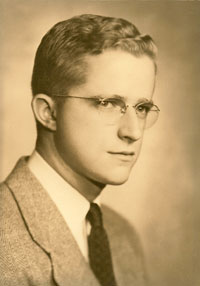I was ten and had been the baby of the family, when my brother Robert arrived in February 1930. We bonded during his infancy and childhood, because I fed him, changed his diapers, baby sat – the whole shebang. When he was old enough, I took him on my bike to visit friends. Our sister and brother were off to college a few years later. In our adult years we lived miles apart. Nevertheless, our family was especially close with Bob and Doris and their children, Susan and Robert.
Bob was a quiet, mild mannered man of integrity and deep conviction. Before Valley College in San Bernardino had African Americans and Latino/a on the faculty, Bob taught Black and Hispanic History. When a new campus opened closer to his home in Redlands, he chose to stay at the urban campus in San Bernardino, because he loved teaching a wide diversity of students. In 1988, when Vietnam still divided citizens – more so than today – Bob read a paper at the Fortnightly Club in conservative Redlands entitled “The Vietnam War Is Back On Campus.”
But his courage and convictions were most apparent after Jonestown. Within days of the tragedy, he came to Reno to be with us. Susan and Robert were devastated by the loss of their cousins. Susan, who had looked to Annie as a role model, was terribly shaken.
Bob and Doris were not intimidated by standing alone in a very conservative community after November 18. They were free from the feelings of the shame which silenced survivors and other relatives. They never worried about coming out of the Jonestown closet, because they were never in it. When media accounts were filled with such terms as “Kooks,” “Crazies,” “Brainwashed,” Bob wrote a letter to the local paper affirming the humanness and good things People Temple members had done. A few days later the paper carried a story about Bob and Doris’ connection with Jonestown. In an essay Bob wrote ten years after the deaths for the book The Need For A Second Look At Jonestown, he described his feelings when he saw friends, and when he went to work, to the Kiwanis Club, to church and to other groups for the first time after November 18. He asked the service club president if he could say a few words. In telling his story, he let people know that they could talk with him. When appropriate, Bob talked about Jonestown and his loss of nieces.
In the sermon I preached the Sunday after November 18, I remarked that: “The forces of death are powerful in our society. The arms race, government distant from the governed, inflation, cybernation, unemployment are signs of death… There is no survival for cities apart from the creation and sustenance of communities within.… This is what made the Jonestown experiment so important for us. It was an effort to build this kind of common life. Its failure is our loss as we struggle against the forces of death in our cities.”
The implicit call to activism touched Bob deeply. A year later, he and Doris invited friends to their home to talk about the arms race. Twenty came. The group organized the Redlands Peace Group. It still continues, 28 years after its founding and in the months after Bob’s death. Since the Iraq war began, this group has held a weekly peace vigil on a downtown corner.
Bob was also involved in many community services, such as a meals program for the hungry for which he collected food from stores. With others, he created and maintained a House and Staff to provide temporary care for dependent children.
In 1985 Bob and Doris went on a tour of the USSR (while it was still the USSR). In ten days they became good friends with their tour leader. Ludmila was a communist and professor of history at Moscow State University. One evening the Redlands Peace Group presented Ludmila with a beautiful peace quilt, made by women in Iowa. Bob told about the origin of the group beginning with his story of Jonestown’s impact upon him. Ludmila was shocked. She asked Bob and Doris if they would talk with her later about their nieces. Bob told her of his nieces’ motivation and about what was right and wrong about Peoples Temple. Later Bob were reminded of Ludmila when he read these words in Hedrick Smith’s book, The Russians: “When a Russian learns that another person has experienced tragedy, the barriers break down and sharing takes place. Tragedy has been a familiar companion of the Russians through the centuries.”
Bob’s response to Jonestown was to transform the tragedy in a means to break down barriers and to use the goals of Peoples Temple – and of his nieces Carolyn and Annie – for activism and community service. His example demonstrates that good can and does triumph over tragedy, that life can and does triumph over death.
(John Moore’s complete collection of writings for this site may be found here.)
